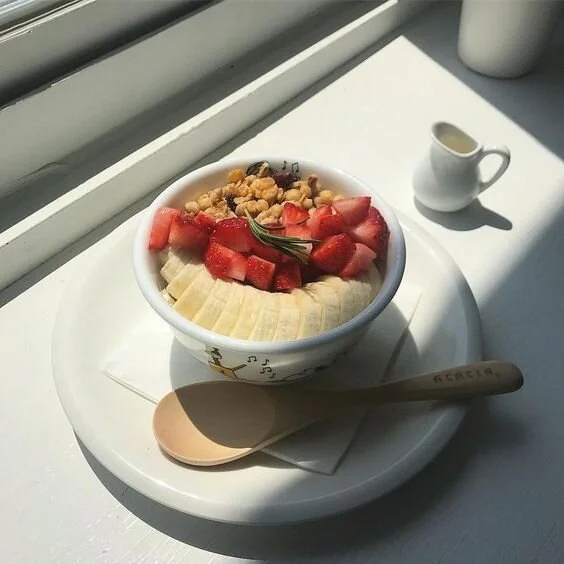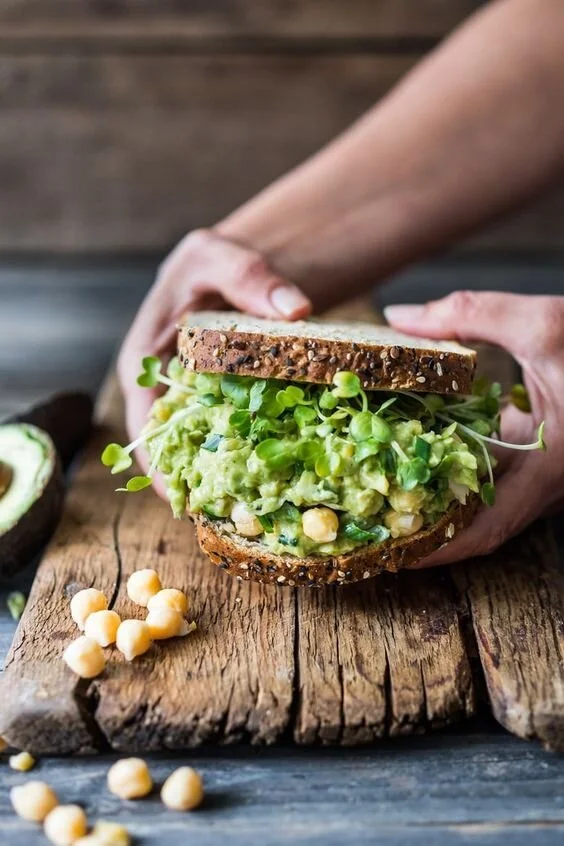The Smile Diet
Hey Muse,
Food influences our smiles. Some effects derive from the pleasantness of the flavor itself, from the bliss of the palate, others are connected to the cultural, economic or social meanings. Memories like the scent of grandma's lasagna. But what we eat is connected to the way we also feel due to its chemistry, indeed.
A GOOD MORNING STARTS FROM BREAKFAST
The mood is like a building whose foundations are combinations of atoms. For example, certain substances that induce relaxation are made with a brick of proteins: tryptophan. While for the euphoria molecule, dopamine, the body must extract iron from the meal.
As the saying goes, a good morning starts in the early hours of the day. This was revealed in a recent English research by the "Food and Mood Project": 55% of the study participants said they were in a better mood when not skipping breakfast.
CHOCOLATE: A SUPPLEMENT OF JOY AND MEMORY
If there is an ingredient that more than any other summarizes our relationship with food, from every point of view, that is chocolate. "There is no metaphysics on earth like chocolates," Fernando Pessoa puts in verse.
Perhaps it depends on the reputation of comfort food, on the comforting sweetness. Who has never tried to drown a love disappointment in the jar of cacao cream? It is not just a perception. Chocolate contains both tryptophan and iron, very important for a positive mood. It also gives carbohydrates and B vitamins, which facilitate the absorption of tryptophan, plus a small charge of nervous system stimulants (caffeine and theobromine).
SERENITY IS FOUND IN LEGUMES
Tryptophan can help creating more peaceful days and nights. It is an amino acid, that is one of the building blocks from which proteins are made, and it is said to be essential because the body cannot synthesize it and must necessarily introduce it with food.
We need it to produce serotonin, the chemical messenger that travels through our neurons and improves mood: it is not for nothing that it is called the neurotransmitter of happiness.
Through a series of experiments, it was proved that people who were given a tryptophan-free diet suffered from irritability, anger and depression.
Where to get it from? In addition to chocolate, it is abundant in veg sources, i.e. in legumes and nuts (from nuts to peanuts, whose daily portion is 30 grams at most). In legumes, like lentils, peas, soy. And green leafy vegetables, like spinach, rich in vitamins (A, C B1-2-6, E, K, PP), minerals (iron, zinc, potassium, calcium) and folate, that support our immune system.
In the vegetable world, bananas, pineapples, potatoes and rice, pistachios, chestnuts and spirulina are also rich in tryptophan. Bananas, in particular, are a concentrate of energy, also thanks to their content in carbohydrates, vitamins (A, C and B6), magnesium, potassium, phosphorus and iron.
To promote the synthesis of serotonin, thanks to the transformation of its tryptophan precursor, it is important to take foods rich in vitamin B, such as avocado, honey, barley, plums, tomatoes etc.
WANNA SLEEP TIGHT?
Tryptophan is also a kind of natural sleeping pill, because it is linked to melatonin, the pseudo-hormone that regulates our biological clocks and thanks to which we fall asleep. And when you spend a peaceful night, the day flows better, you know.
It has been discovered that the amino acid can more easily reach the brain, after passing from the mouth to the blood, if you eat carbohydrate-rich foods. This explains the desire for sweets in women suffering from premenstrual syndrome, irritable and close to depression in the days preceding the cycle.
Other important foods useful for having the right daily energy are seeds, such as pumpkin, sunflower and sesame seeds, nuts like walnuts and almonds, also rich in magnesium, against fatigue and nervousness, and folic acid, which helps the nervous system. In addition, they help to keep our mood up, thanks to their content in tryptophan.
CARBS FOR BRAIN ENERGY & CONCENTRATION
Carbohydrates are indispensable in general.
They supply glucose, from which energy of immediate use is also obtained for the brain, which uses 20% of all the fuel necessary for the body.
Not having enough blood sugar (hypoglycemia) makes you feel weak, tired and confused. It can happen during a very restrictive weight loss regimen, when you follow irregular eating habits or after extreme exercise.
Glucose ensures concentration and alertness. Having said that, it makes no sense to imagine increasing the brain's power with rations of candies and the like: once the blood sugar level reaches normal values it does not increase anymore (and the excesses, indeed, are deleterious for the line and health).
The healthiest sources of carbohydrates are whole grains, fruit, legumes, vegetables. Whole grains, in particular oats, are rich in vitamin B1, folate and zinc, useful to boost the mood and fight depressive states, gifting pleasant energy.
SAD? EAT SPINACH
These same foods provide micronutrients which in their alchemy influence emotional states and cognitive functions. To be precise, green leafy vegetables, from spinach to chicory, are very rich in folate (B vitamins), the lack of which seems to increase the possibility of feeling depressed, especially in the elderly. And hypotheses are made about a positive reflection of vitamin C, exuberant in fruits such as kiwis and citrus fruits.
The lack of other B vitamins (thiamine B1, niacin B3 or cobalamin B12) can lead to sluggishness, irritability or a feeling of sadness, as stated in the popular publications of the Harvard Medical School in Boston.
VITAMINS: A REAL INJECTION OF VITALITY
Vitamin C is essential for our health, as it keeps our immune defenses high and promotes cell regeneration.
It is therefore important to make a daily supply of fresh and seasonal fruits and vegetables rich in this important vitamin.
Abundant in kiwis, citrus fruits, peppers, carrots, yellow-orange fruits and vegetables with a high content of vitamin C. Red fruits such as strawberries, cherries, blueberries, blackberries and raspberries are also rich, as well as containing antioxidants which act against free radicals, with an anti-aging and protective effect on the nervous system. In addition to mood, thanks to their content in serotonin, in fact, they improve concentration and memory. Yellow, orange or red fruit and vegetables always brings joy, even if only because of the lively color which turns out to be a real injection of vitality. Another very important vitamin to keep the mood high is vitamin D, synthesized thanks to sunlight, must also be introduced into the body through nutrition. The foods that contain it are egg yolk, mushrooms, and fatty fish (salmon, mackerel, sardines).
MINERALS AGAINST ANXIETY
Minerals are no less indispensable for a smile. It is good to go hunting for selenium, disseminated in a series of foods, but abundant in sunflower seeds and enriched potatoes. The best are the Brazilian nuts: only two correspond to the recommended daily dose of selenium, which among other things falls within the constitution of enzymes involved in cell defense against free radicals. Selenium is also a fundamental element for our good mood, which helps to fight seasonal depression.
Another protagonist of good mood is magnesium, which the body uses in the transmission of the nervous impulse and in the production of energy: if the quantities in circulation are not sufficient, you can experience insomnia, agitation, nervousness, anxiety. Maybe not enough is taken with meals, but we must know that pregnancy, breastfeeding, physical exertion and chronic stress come to decrease the mineral levels.
IRON EUPHORIA
With menstrual flow, women may experience iron deficiency. The element is necessary for the synthesis of serotonin, the chemical messenger of happiness, and also for the production of dopamine, the neurotransmitter that participates in a series of cognitive functions: from reward and pleasure mechanisms to attention span, from the sleep process to the mood regulation.
Someone calls iron the molecule of euphoria. And really, when it is lacking, you enjoy life less.
You don't have to eat horse steak to get iron, as many still believe. In animal sources, except in milk and cheese, there is the one called heme, from meat to fish and mollusks (clams are very rich), but the organism absorbs iron also from the vegetable world, especially from legumes, from vegetables leafy, from cauliflower and broccoli, from dried fruit and oil seeds. And, once again, from chocolate.
LIKE IT SPICY?
Excellent, because it is also good for your mood. Through capsaicin, the substance responsible for the 'spiciness' in these foods, endorphins are released, substances with effects similar to morphine, but produced naturally by the body.
MAKE GUT MICROBIOTA HAPPY WITH FIBERS
The new studies now focus on the intestine-brain axis. A recent Italian-Argentine study (conducted by the Italian Association of Hospital Gastroenterologists and Endoscopists, Aigo) showed that 14.5 percent of patients with irritable bowel syndrome suffer from depression and even 35.9% of anxiety due to pathological levels.
On the contrary, and it seems incredible, some bacteria that we host in our microbiota dry the tears: they are called Oscillibacter and in our belly they secrete substances that act as natural anxiolytic.
Nutritionists and gastroenterologists work to find out which foods could favor friendly microorganisms. There is no doubt that the fibers of legumes and vegetables, whole grains and fruit represent a lavish lunch.
Tomorrow, who knows, it could be a painless transplant of bacteria to resolve the drop in the mood. In experiments on mice, it was seen that calm animals, receiving the intestinal microbes from the stressed ones, became anxious and, vice versa, the calm microbiota placated the agitated mice. We will see how research develops in the next few years.
In the meantime, enrich your diet with the “smile foods” and stay happy!
Much Love,
Manuela




